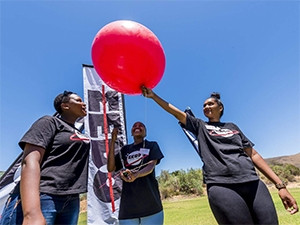
The Meta Economic Development Organisation (MEDO) space programme has announced Africa's first private satellite, MEDOsat1, will launch in the second quarter of 2016.
Set up last year, the MEDO space programme encourages South African female high school learners to enter STEM (science, technology, engineering and mathematics)-related fields. Working with Isuzu Trucks South Africa, MEDO bought the first privately-owned satellite in Africa with the goal of having female high school learners design its payload.
As part of the launch of the satellite later this year, South African female high school learners will help design the payload for the satellite.
MEDO CEO Judi Sandrock says the candidates will participate in an intensive brainstorming process, discussing the kind of payload the satellite will carry.
Once launched, all learners who participated in the various initiatives will be able to participate in a programme where they will be able to communicate with the satellite and experiment with communication and data gathering while it is in orbit, explains Sandrock.
"By 2020, 80% of all future jobs will be STEM-related, with almost double the pay of non-STEM-related careers. So what we are trying to do is to give these young women the best chance out there," says Sandrock.
STEM careers
The MEDO space programme is divided into three stages. It starts with SpacePrep workshops, followed by a week-long intensive boot camp dubbed SpaceTrek, and the final stage is the launch of the satellite, which will take place in the second quarter of 2016 at the Mojave Desert in the US.
The MEDO programme was launched in partnership with Morehead State University in Kentucky, US. Morehead State University runs a similar project, SpaceTrek, which has seen positive results in encouraging young women to enter what is still perceived as male-oriented fields or careers.
Outside of the US, South Africa is the first and only country worldwide that has received the go-ahead from the Morehead Space Science Centre to run the programme.
According to Sandrock, the MEDO programme was developed in response to the organisation's observation that many of the corporates it works with experience a lack of skilled STEM employees.
"South Africa's future depends highly on people with STEM-focused careers. Every year, fewer learners are selecting STEM subjects required to address the country's critical skills shortage. It is important that we focus on developing a significant number of young people with STEM-focused careers in order to compete internationally."
Sandrock adds: "Historically, people were excluded from learning subjects such as maths and science, so there is a legacy with some parents of not necessarily encouraging the youth to pursue careers in these fields. This is where we believe we can make an impact in assisting parents in creating this inspiration in our children and the desire to pursue careers in STEM."
According to MEDO, South Africa's women in STEM programme will run for the next four years with a satellite launch planned each year.
Boot camp
To get learners prepared, MEDO held a week-long boot camp from 5 to 11 January, where STEM candidates were able to test small satellite payloads using weather balloons.
For this camp, 14 young women were selected to learn about telecommunications, satellite construction, calibration, and data analysis.
Sandrock explains that each day consisted of a series of group activities, and guest presentations. Each day had a dedicated theme designed to further the learners' knowledge in STEM and provide them with the necessary experience to develop the payload for Africa's first privately-owned satellite, she says.
Day one of the boot camp explained the mission and provided information on the Earth's atmosphere. Day two was dedicated to electricity, components, schematics, multimeter and soldering. Day three taught CricketSat construction and calibration. Day four educated the girls on telecommunications and radio building. Day five saw them launching the CricketSat, which the learners built from scratch, into near space environment with the help of weather balloons.
On the last day of the boot camp, the young women presented their findings to scientists, professors and business men and women in Cape Town.
Share